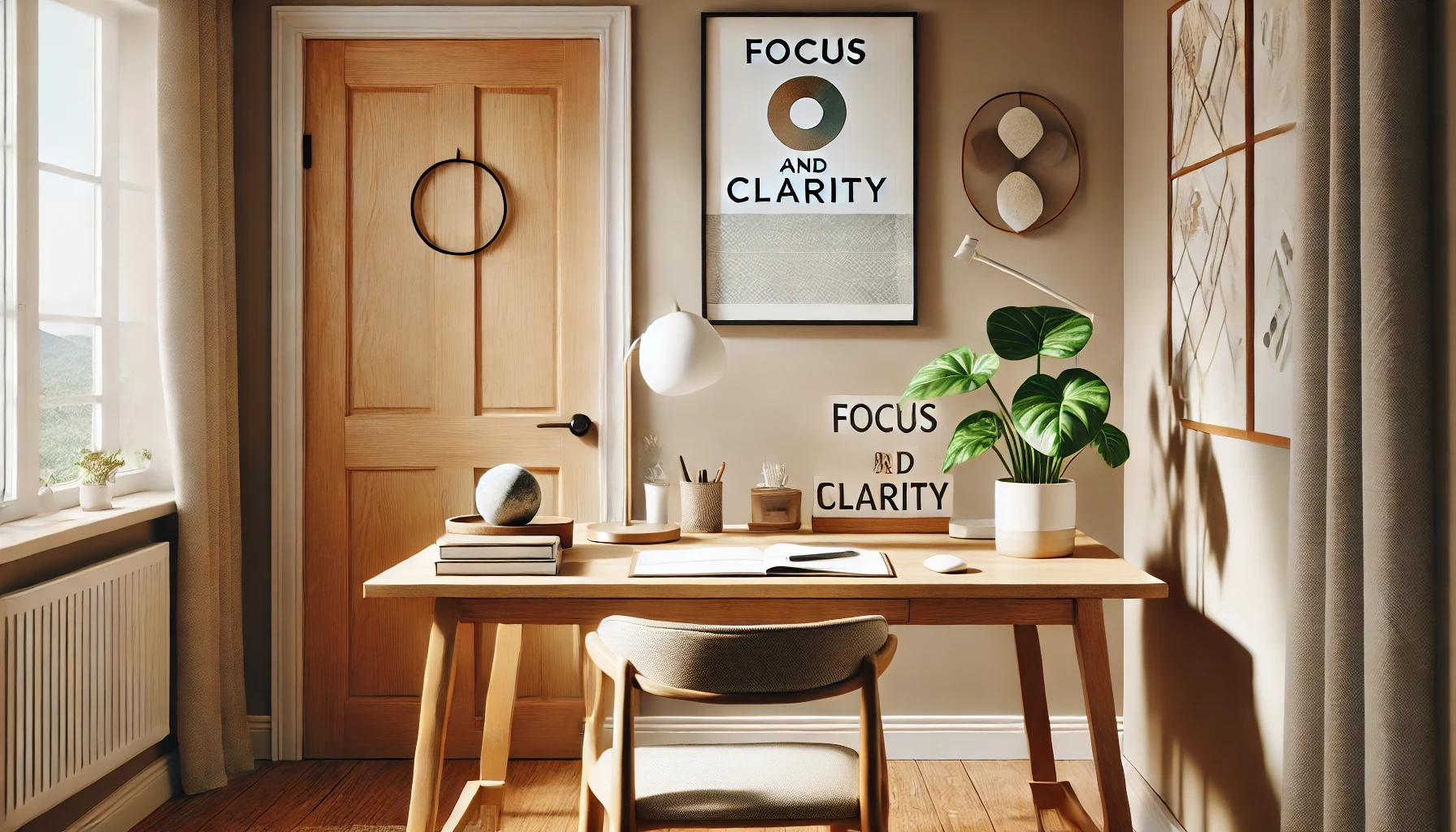In a world full of distractions, cultivating mental clarity is essential—not just for productivity, but for peace of mind. Feng Shui provides practical tools to reduce mental clutter, sharpen focus, and create an environment that supports clear thinking and intentional action. Whether you need to concentrate on work, make decisions, or simply calm your thoughts, your space can help.
Here’s how to use Feng Shui to enhance mental clarity and stay focused throughout your day.
1. Clear Physical Clutter to Clear Mental Clutter
In Feng Shui, your external environment reflects your internal state.
- Start with the areas you spend the most time in: desk, kitchen, bedroom
- Remove objects you no longer use, love, or need
- Keep surfaces clear—especially workspaces, countertops, and nightstands
- Do a 10-minute tidy at the start of each day to reset the energy
Clutter confuses your Chi—clearing it clears your mind.
2. Simplify Your Visual Field
Too much visual input overloads the brain.
- Use neutral tones and minimal patterns in work or thinking areas
- Avoid gallery walls or busy art in focus zones
- Choose a few meaningful objects over many decorative ones
- Face a blank wall or nature view while working, rather than an open space
Focus improves when your surroundings are visually quiet.
3. Use the Bagua Map to Activate the Knowledge and Self-Cultivation Area
According to Feng Shui, the Northeast area of your space governs wisdom and mental clarity.
- Decorate this area with books, learning tools, or calming art
- Use earth tones (brown, beige, terracotta) and square shapes
- Add symbols of growth: a journal, candle, or mountain imagery
- Keep this zone organized and inspirational
This area strengthens focus through grounded energy.
4. Position Your Desk or Work Zone in the Command Position
Control over your space = clarity in your mind.
- Face the door without being directly in line with it
- Avoid sitting with your back to the room or to open windows
- Place your desk against a solid wall for mental support
- Keep cords, supplies, and electronics organized and intentional
This posture enhances focus, decision-making, and confidence.
5. Use Light to Stimulate Alertness Without Overwhelm
Light supports the brain’s natural rhythms.
- Let natural light in during the day—work near a window if possible
- Use a bright desk lamp that mimics daylight
- Avoid fluorescent lighting or overly dim environments
- Use warmer tones for relaxed focus, cooler tones for analytical tasks
A well-lit space keeps your mind energized and awake.
6. Add Plants for Clean Air and Mental Freshness
Plants help regulate energy and support calm cognition.
- Choose low-maintenance, air-purifying plants like pothos, peace lily, or bamboo palm
- Place them in work zones, near windows, or on bookshelves
- Avoid thorny or spiky plants in focus areas
- Keep them healthy—wilted plants can drag down energy
Living greenery renews mental energy.
7. Use Earth and Metal Elements to Ground and Focus
These elements help stabilize thoughts and create clarity.
- Earth: Add stone decor, square shapes, earthy tones, or clay items
- Metal: Use metal trays, white or gray tones, circular items, and organized shelving
- Combine both for balanced energy—structured but not rigid
- Avoid too much water or fire in focus zones, which can scatter energy
Elemental balance = mental balance.
8. Incorporate Calming Sounds or Silence
Auditory input can either distract or center you.
- Play soft instrumental music or nature sounds during tasks
- Use white noise or brown noise to reduce mental chatter
- Try noise-canceling headphones if needed
- Or embrace intentional silence to let thoughts settle
Control sound to support internal stillness.
9. Add a Focal Object to Anchor the Mind
The mind benefits from a single, grounded point of focus.
- Place a small sculpture, plant, or crystal in your line of sight
- Choose something that feels grounding, inspiring, or calming
- Let it be a cue to return to focus when you feel scattered
- Avoid flashy or brightly colored objects that can distract
Let your eyes—and thoughts—rest on something steady.
10. Refresh the Space When Energy Feels Stuck
Stuck space = stuck thoughts.
- Open a window for fresh air
- Rearrange your desk or switch out a piece of decor
- Burn sage, palo santo, or incense to clear mental fog
- Use bells or clapping to reset the room’s vibration
Even a small shift can open up a new mental perspective.
11. Set Clear Intentions for the Space
Energy responds to clarity of purpose.
- Say a short affirmation aloud before starting work:
- “I think clearly and act with focus.”
- “This space supports my mental clarity.”
- Write it on a sticky note or place a quote on your desk
- Light a candle or touch a grounding object to begin with presence
Clear intention invites clear results.
12. Maintain Consistency and Ritual
Clarity comes from rhythm.
- Use the same spot for focus-related tasks each day
- Begin with the same ritual: stretch, light a candle, say your affirmation
- Keep a regular cleaning schedule for the space
- Respect the area by not eating, scrolling, or multitasking excessively there
Repetition turns your space into a powerful mental ally.
Final Thoughts: Clarity Begins with Your Environment
Your mind doesn’t work in isolation—it mirrors your space. By designing a home that encourages simplicity, stability, and focus, you create a container for deep thought, creativity, and clarity.
Feng Shui isn’t just about flow—it’s about making space for what truly matters. Let your environment sharpen your thoughts, support your focus, and remind you of your inner wisdom.
